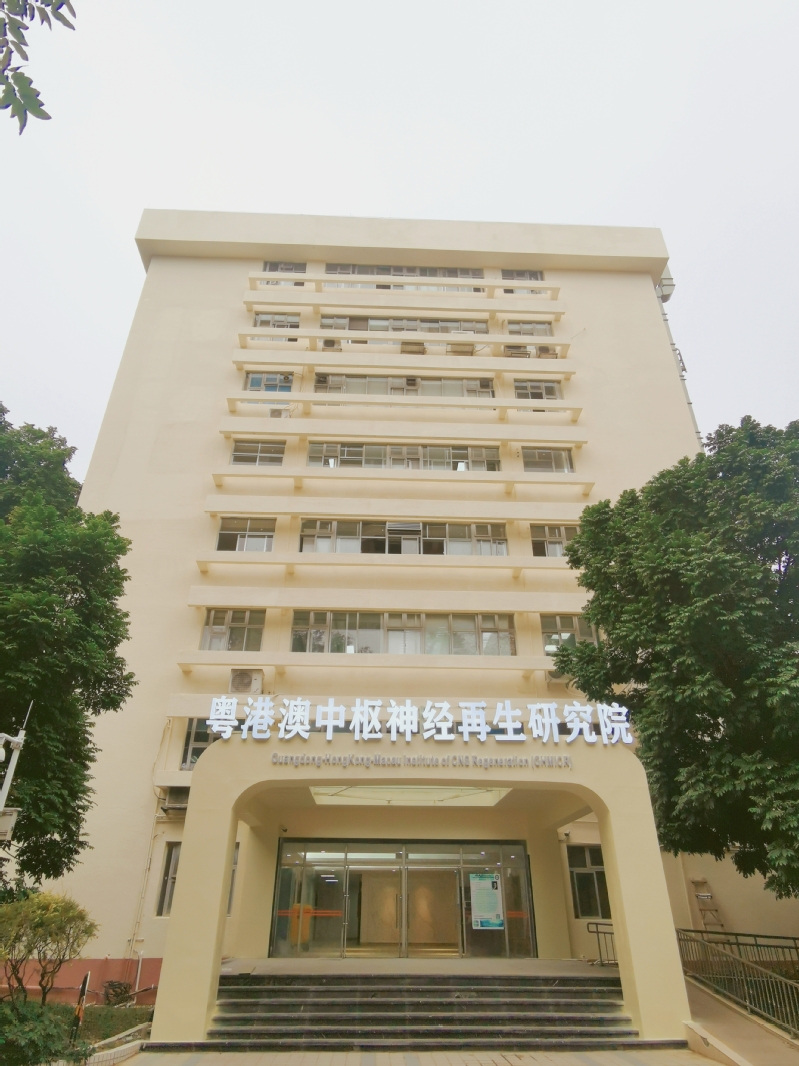

[Overview of GHMICR] Formerly set up in October 2008 as Joint Laboratory of Brain Function and Health (BFAH) between Jinan University and the University of Hong Kong, the Guangdong-Hong Kong-Macao Institute of Central Nervous System (CNS) Regeneration (GHMICR) was founded in November 2012 at Jinan University, and has been chaired by Prof. Kwok-Fai So, a member of Chinese Academy of Sciences. Ever since its establishment, increasing outstanding talents around the world (e.g. Hong Kong SAR, Belgium, USA, UK) have joined GHMICR and formed a young, well-cooperative and productive research team. So far, the institute has highlighted several unique directions for in-depth investigation on the key issue of CNS regeneration & repair, such as molecular regulation of nerve growth, spinal cord injury & repair, pathology & intervention of brain injury, visual system injury & repair, and disease modeling using non-human primates.
[Establishment of the discipline] As the Guangdong Provincial Medical Key Laboratory as well as the entity of Collaborative Innovation Center for Neural Regeneration, GHMICR was further approved to initiate the construction of Joint International Research Laboratory of CNS Regeneration by the Ministry of Education of China at the end of 2015. The institute is currently occupying an area of more than 2000 square meters, together with research instruments worth over 40 million RMB.
[Research achievements] Since its establishment, investigators of GHMICR have managed to acquire over 50 scientific research grants from provincial, ministerial or national funding agencies, including three 973 National Key Projects and 15 NSFC Projects, with a total amount of ~ 50 million RMB. In recent years, 192 SCI papers by GHMICR scientists have been published in high-profile science journals, such as Cell, Neuron, Nature Communications, Nature Medicine, PNAS, Journal of Neuroscience, Neuropsychopharmacology, etc. Meanwhile, great progress has been made concerning the application of novel findings via organizing a series of clinical translational research and trials.
[Introduction of the research team] GHMICR currently has 22 full-time principal investigators, four chair professors and 24 technicians; all these in-service key researchers graduated from or previously worked in prestigious universities overseas. Currently, there is one member of Chinese Academy of Sciences, one member of the Royal Academy of Engineering, one recipient of Chang Jiang Scholars Program and one recipient of the Program for New Century Excellent Talents in University” by the Ministry of Education of China, two recipients of “National Excellent Young Scientists Fund”, one recipient of “Thousand, Hundred, Ten Talents Scheme” by Guangdong Province, two recipients of “Guangdong Provincial Supporting Scheme for Hundred, Thousand, Tens of Thousand Leading Talents”, one recipients of “Guangdong Provincial Science Fund for Distinguished Young Scholars”, one recipient of “Guangdong Provincial Fund for Fostering Excellent Young Teachers in Universities” and multiple recipients of talents schemes from Guangzhou and Jinan University.
[Overseas Exchange] GHMICR has established a long-term cooperative relationship with numerous renowned overseas universities, by hiring visiting professors, conducting joint research projects and mentoring graduate students by faculty members from both sides. For each year, the institute generally invites over 30 foreign experts, and holds a number of academic seminars and symposiums. On September 23, 2015, GHMICR succeeded in hosting The 2015 International Symposium on Brain Function and Health & Nerve Regeneration Summit Forum, and invited John Gurdon, a professor of Cambridge University who was awarded the Nobel Prize in Physiology or Medicine 2012, to give a plenary speech. Between July 26 and 29, 2018, GHMICR again successfully hosted The 2018 International Nerve Regeneration Summit Forum, where Prof. Thomas C. Südhof, the Nobel laureate in Physiology or Medicine 2013, and Prof. Michael V. Sofroniew from UCLA to give plenary talks.
[Cultivation of young talents] GHMICR currently offers academic programs for Master’s and Doctoral degrees in neurobiology, approved by the Ministry of Education of China. The numbers of full-time mentors for M.Phil and Ph.D programs are nine and fourteen, respectively. Ever since its establishment, totally 76 post-graduates have been enrolled. At present, there are 47 M.Phil and 11 Ph.D candidates. Following graduation, many students left the mainland China to USA, Singapore, and Hong Kong SAR in the pursuit of an advanced course of studying or training.

